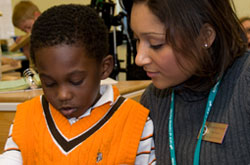College of Medicine receives grant for community-based clinical research
TALLAHASSEE, Fla. —The Florida State University College of Medicine and the University of Florida have jointly received $600,000 from the State University System of Florida Board of Governors to strengthen research, education and service efforts in areas of public health and to boost economic growth.
The award, under the New Florida 2010 Scholar’s Clustering Grant Program, aims to foster collaborations among state institutions in the areas of health, science and engineering. It is part of a broader program to engage the state university system in the creation of high-skill, high-wage, knowledge-based employment opportunities.
The funds will support the UF-FSU Community Research Collaborative Program, a research effort that combines Florida State’s strength in community-based medical education with UF’s expertise in clinical and translational science research.
“Working with physicians in the community setting will provide new and invaluable research opportunities where the majority of patients get health care in Florida,” said John P. Fogarty, M.D., dean of the Florida State University College of Medicine.
The project will establish a statewide network of facilities affiliated with the two universities that will connect local communities with teams of clinical scientists, physicians and physicians-in-training, creating new opportunities to conduct clinical and public health research.
“This new program, grant and FSU partnership accelerate our commitment to move medical advances from university laboratories into Florida communities, making positive and lasting differences in the lives of the people of Florida," said Michael Good, M.D., dean of the UF College of Medicine. “Our mutual goal is to change lives for the better and significantly improve health throughout our state.”
In addition to benefiting the state’s 19 million residents, the universities will be able to create new opportunities and advances for physicians, scientists and medical students while exploring the causes, prevention, diagnosis and treatment of diseases.
Initial efforts will involve two projects:
- Assessing and monitoring cases of mild traumatic brain injury and of health risk behaviors among youngsters in Florida. The project will give physicians and medical students access to state-of-the-art instruments that will allow surveillance, detection and follow-up of mild traumatic brain injury cases among youth who take part in organized sports.
- Evaluating practices already in use by pediatricians and family physicians for assessing and monitoring health risk factors such as diet, exercise and obesity in children and adolescents, and seeing how information technology can aid the process.
The College of Medicine has an established network of more than 1,900 community physicians across the state, who provide care for more than 2 million Florida residents. The research initiative will present opportunities for affiliated physicians to participate in projects that are of potential benefit to their current and future patients.
“Our community-based medical education model is vital to our mission of focusing on primary care and in the development of the FSU Clinical Research Network that will involve hundreds of medical practices in six cities across the state,” said Michael Muszynski, M.D., regional campus dean for research at Florida State. “With these relationships and this grant we’ve got a great first step in putting community-based health care research to work for the people of Florida.”
UF’s resources for the Community Research Collaborative Program include the long experience and expertise of researchers in the CTSI in clinical studies and biomedical informatics. That will enable researchers to formulate sound protocols for collection and analysis of vast amounts of health data relating to the entire state or to subsets of the population. The institute integrates the research and training activities of 12 colleges, two clinical campuses, two regional health care systems and connections in all 67 counties in the state.
“This is a huge opportunity to expand our ability to engage physicians and patients across the state in clinical research, with the goal of improving health,” said Michael Conlon, chief operating officer of the UF CTSI. “We’re going to be able to do community-based research across the state because of this partnership.”
The collaboration also stands to have a large economic impact on the state. Research that allows health risk identification, disease marker detection and injury avoidance will translate into savings in health care dollars that would otherwise be spent to treat illness.
“With an established clinical research infrastructure we will be in position to help attract even more research dollars to the state and help address a slate of other health issues, as well,” said Myra Hurt, Ph.D., senior associate dean for research and graduate programs at the Florida State College of Medicine. Hurt is co-principal investigator for the project, along with David Nelson, M.D., director of the UF Clinical and Translational Science Institute.
“Working together, the universities will create new opportunities and advances not only for physicians, scientists and students, but most importantly, for the citizens of Florida, as we explore patient-oriented research into the causes, prevention, diagnosis and treatment of diseases,” Nelson said.


